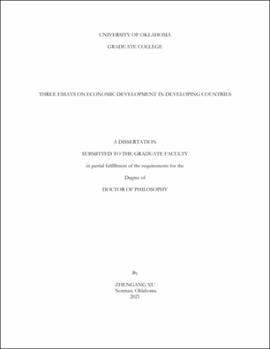| dc.description.abstract | Chapter 1: This paper studies the economic impact of president Xi Jinping’s Eight Regulations of Austerity and coordinated anti-corruption campaign. Specifically, I examine the effects of this campaign on the pattern of household expenditures in China using a triple differences approach. I compare the expenditures of households with government employees with those households without government employees, before and after the anti-corruption reform, across commodities that are likely to be subject to corruption compared to those that are not. I show that in the post-reform period, government affiliated families spend relatively more on goods that they are likely to have obtained illegally through bribes before. In contrast, expenditure patterns for goods that are less likely to be subject to corruption do not exhibit a relative increase in the post-reform period. These expenditure changes are largest for low level officials’ families and the bulk of the increase occurred for non-Chinese Communist Party member government employees and among those outside President Xi Jinping’s powerbase. This suggests that those with the strongest ties to the party were able to avoid the effects of the anti-corruption campaign.
Chapter 2: While the Chinese government’s stated position is religious freedom, the Chinese Communist Party (CCP) is officially atheist. Individuals who profess a faith are typically unable to join and members who practice a religion face expulsion and a loss of benefits. It is unknown exactly how much these policies play a role in shaping t religious affiliation in China. For instance, through assortative matching, non-religious individuals may simply have been those who would have joined the CCP regardless. This paper studies the extent to which the CCP’s policies regarding religion may influence religious identification over the life cycle in China. To do so, I contrast changes in religious affiliation before and after retirement for CCP members and non-CCP members. In theory, individuals who were in the CCP but religious may have chosen to hide these beliefs while working in order to not lose out on party benefits. I find no evidence of any increase in membership after retirement – suggesting either: (1) individuals who are non-religious in the CCP simply choose to remain so after retirement or (2) some degree of lingering benefits associated with CCP membership even after government employment ends are large enough to disincentivize religious uptake.
Chapter 3: This paper investigates the impact of the Arab Spring protests on missing women in Egypt through a spatial Differences-in-Differences analysis. We compare the missing women in high protest intensity governates with those in low protest intensity governorates; before and after the Arab Spring across different phases of the Arab Spring and across different age groups. The results reflect the different effects of different protest on missing women in the Arab Spring and effects in different age groups. The empirical results indicate that after the Arab Spring movement, the missing women significantly decreased in high protest intensity areas, suggesting that the Arab Spring saved many women. Furthermore, the missing women decreased more after the third phase of the Arab Spring. Last but not least, we find that the number of missing women decreased more in younger age group, specifically from 0 to 1 year old. | en_US |
